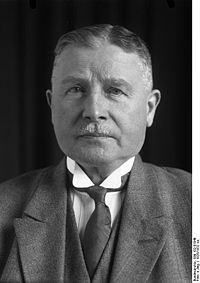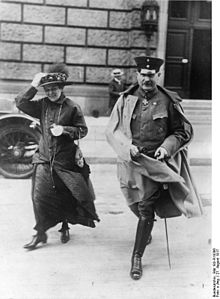Wilhelm Groener - Picture
More about World War 1

|
|
Wilhelm Groener
Wilhelm Groener

Picture - Chief of the German General Staff
: In office
3 July 1919 - 7 July 1919
Preceded by: Paul von Hindenburg
Succeeded by: Hans von Seeckt
: Reich Minister of Transport
Weimar Republic
: In office
25 June 1920 - 12 August 1923
Chancellor: Konstantin Fehrenbach
Joseph Wirth
Wilhelm Cuno
Preceded by: Gustav Bauer
Succeeded by: Rudolf Oeser
: Reich Minister of Defence
Weimar Republic
: In office
20 January 1928 - 30 May 1932
Chancellor: Wilhelm Marx
Hermann Mx¼ller
Heinrich Brx¼ning
Preceded by: Otto Gessler
Succeeded by: Kurt von Schleicher
: Reich Minister of the Interior
Weimar Republic
: In office
9 October 1931 - 30 May 1932
Chancellor: Heinrich Brx¼ning
Preceded by: Joseph Wirth
Succeeded by: Wilhelm von Gayl
:
Born: 22 November 1867(1867-11-22)
Ludwigsburg, Wx¼rttemberg
Died: 3 May 1939(1939-05-03) (aged 71)
Potsdam, Nazi Germany
Nationality: German
Political party: Independent
Karl Eduard Wilhelm Groener (22 November 1867 - 3 May 1939) was a German soldier and politician.
Biography
He was born in Ludwigsburg in the Kingdom of Wx¼rttemberg, the son of a regimental paymaster. He entered the Wx¼rttemberg Army in 1884, and attended the War Academy from 1893 until 1897, whereupon he was appointed to the General Staff (1899). For the next seventeen years he was attached to the railway section, becoming head of it in 1912. In November 1916 he moved into the Prussian War Ministry as deputy war minister and was in charge of war production. In August 1917 Groener served as chief of staff of an army group in Ukraine.

Picture - Groener as deputy war minister (1917) (on the left is his wife)
On the resignation of Erich Ludendorff on 29 October 1918, Groener became First Quartermaster General (Deputy Chief of the General Staff) under Field Marshal von Hindenburg. Germany's military situation was worsening under the onslaught of the enemy, and social unrest and rebellion among both the German armed forces and the civilian population threatened to break out into revolution. In November, Groener advised Kaiser Wilhelm II that he had lost the confidence of the armed forces and recommended abdication to the monarch.
With the Kaiser's abdication on 9 November 1918 the Marxist Spartacist League had declared a soviet republic in Berlin. Social Democrat leaders Friedrich Ebert (newly-named Chancellor) and Philipp Scheidemann sought to forestall the Communists' action and - evidently on the spur of the moment - Scheidemann proclaimed the Republic.
Groener, who was second-in-command of the German Army and who had known Ebert from the soldier's days in charge of war production, contacted the socialist leader that evening. The two men concluded the so-called Ebert-Groener pact, which was to remain secret for a number of years. For his part of the pact, Ebert agreed to suppress the Bolshevik-led revolution and maintain the defeated Army's role as one of the pillars of the German state; Groener in turn agreed to throw the weight of the still-considerable Army behind the new government. For this act, Groener earned the enmity of much of the military leadership, much of whom sought the retention of the monarchy.
Groener subsequently oversaw the retreat and demobilisation of the defeated German army after World War I ended with the armistice of 11 November 1918.
After his resignation from the army (30 September 1919) to protest the signing of the Treaty of Versailles, Groener was in and out of retirement during the 1920s. He served as Transportation Minister between 1920 and 1923. He succeeded Otto Gexler as Defence Minister in 1928, a post he held until 1932. In 1931 he also became acting Interior Minister, and favoured the banning of the Nazi storm troopers (SA). When he rose to defend his views of the banning of the SA in the Reichstag, he was violently attacked by Hermann Goering. The defense minister tried to defend himself, but suffering from diabetes and heart trouble, the old man was overwhelmed by abuse from the Nazi benches. Exhausted and humiliated, Groener left the chamber, only to walk into Kurt von Schleicher, who told Groener he must resign as Defense minister. He appealed to President Hindenburg, but Hindenburg claimed he could do nothing about it. On 13 May, Groener resigned, humiliated and ridiculed throughout Germany, and disappeared from public life.
Groener was married twice: Helene Geyer (1864-1926), with one daughter, Dorothea Groener-Geyer {b.1900}, and Ruth Naeher-Glx¼ck, with whom he had a son. Groener died in Potsdam-Bornstedt on 3 May 1939.
Eschenburg, Theodor "The Role of the Personality in the Crisis of the Weimar Republic: Hindenburg, Brx¼ning, Groener, Schleicher" pages 3-50 from Republic to Reich The Making Of The Nazi Revolution edited by Hajo Holborn, New York: Pantheon Books, 1972.
Groener, Wilhelm. Lebenserinnerungen: Jugend-Generalstab-Weltkrieg. Edited by Friedrich Frhr. Hiller von Gaertringen. Gx¶ttingen: Vandenhoeck und Ruprecht, 1957.
Groener-Geyer, Dorothea. General Groener: Soldat und Staatsmann. Frankfurt a. M.: Societx¤ts-Verlag, 1955.
Haeussler, Helmut H. General William Groener and the Imperial German Arm. Madison: State Historical Society of Wisconsin for Dept. of History, University of Wisconsin, 1962.
Hx¼rter, Johannes. Wilhelm Groener: Reichswehrminister am Ende der Weimarer Republik (1928-1932). Munich: Oldenbourg, 1993.
Rakenius, Gerhard W. Wilhelm Groener als Erster Generalquartiermeister: Die Politik der Obersten Heeresleitung 1918/19. Boppard a.R.: Boldt, 1977.
Stoneman, Mark R. âWilhelm Groener, Officering, and the Schlieffen Plan.â PhD diss., Georgetown University, 2006. abstract
Wheeler-Bennett, Sir John. The Nemesis of Power: German Army in Politics, 1918-1945. New York: Palgrave Macmillan Publishing Company, 2005.
"Groener, Wilhelm". Encyclopx¦dia Britannica (12th ed.). 1922.
More aircraft.
Source: WikiPedia